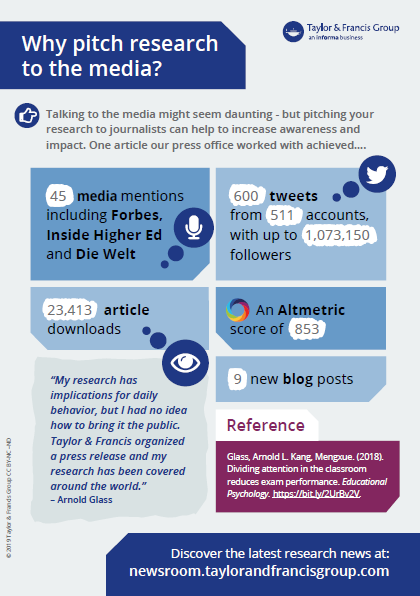Your journal in the news: why?
How and why an effective press campaign could help take your journal to the widest possible audience.
At Taylor & Francis, we work with our editors and authors to ensure that cutting-edge research reaches the widest possible audience. If suitable, a press campaign can be a hugely impactful way to do this.
If you think an article you have recently accepted would be interesting to a wider audience, why not highlight it to our Press & Media Relations team via the press nomination form?
What can a press campaign do for research?
Increase awareness of research
Press is often seen as a way to reach the general public, which is hugely valuable in itself, but it’s also an excellent tool for reaching other researchers. A press campaign can target specialist and subject-specific publications which are aimed at those working within the industry.
Help lead to a change in practice
In many subject areas, research aims to inform policy and practice, to show its relevance outside the field.
A guide from the UK’s National Institute for Health and Clinical Excellence lists “unawareness of, and lack of familiarity with the latest evidence based guidance” as a major barrier to change in practice. The media’s wide reach and potential for specialized targeting make it a powerful tool for speaking to the right audience, to combat this barrier.
Provide a channel for academics to give back
Taylor & Francis’ white paper ‘Peer Review in 2015: A Global View‘ lists the top motivation of researchers to publish as “making a contribution to the field and sharing results”. As a journal editor, you play a key part in enabling this.
Media coverage can help the public understand research – both how it benefits them personally, and wider society. It can also ensure certain issues remains on the public agenda and in government organisations.
Support researchers’ bids for future funding
The benefits of media coverage are highly tangible, in terms of article views and downloads, and from this exposure there are often financial gains too.
Funders are likely to invest more if researcher has a strong media profile when considering applications. The charitable organisation, the Science Media Centre, states in their 2015 ‘Why Engage with the News Media‘ report:
“Many of the scientists we work with have been approached with offers of funding since their comments appeared in the media.”
Supporting the positive perception of scientists
Some fear that the media may inaccurately represent complex scientific findings, which could lead to public mistrust of the profession. However, the Science Media Centre argues this means there is a greater need than ever to speak up. They say:
“The majority of the public get their information about science from the media… The more controversial the science, the more important it is for the public to hear from the most qualified experts.”
So what are you waiting for? Use our guide to identifying newsworthy research and get in touch with the Press & Media Team via this press nomination form to highlight articles which could be right for a press campaign.